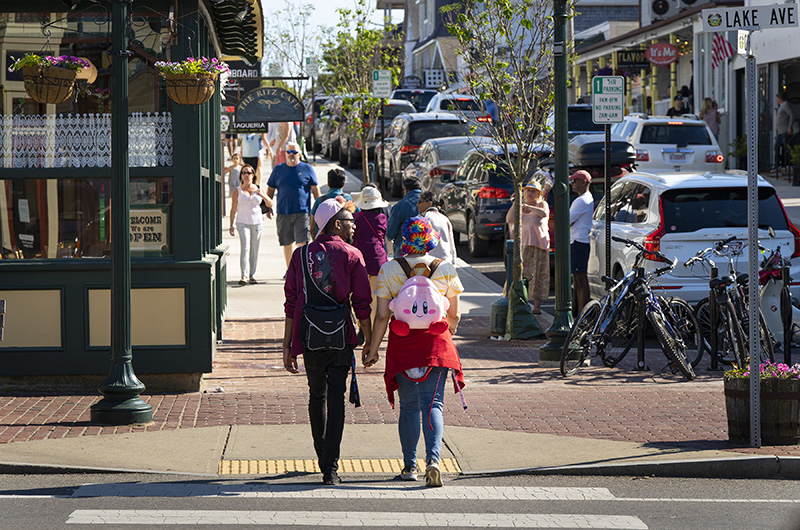The Department of Homeland Security announced sweeping changes to its H-2B seasonal worker visa program last week that include nearly doubling the cap on visas in 2023 and streamlining aspects of the hiring process — leaving Island businesses excited, but still cautious, as they already begin preparations for next summer.
The H-2B visa program allows employers to temporarily hire non-citizens to perform non-agricultural jobs in the United States, with the burden on the businesses to prove the jobs can’t be filled by domestic labor.
Island businesses have traditionally relied on the H-2B and J-1 visas (which go to foreign students) to supplement summer staff, with hundreds of foreign workers descending on the Island hospitality and food service industries. Over the past several years, however, the program has been subject to new regulations and Covid travel restrictions that caused uncertainty and instability for the seasonal businesses who depend on it.
Those issues have been the subject of intense lobbying from local politicians and businesses, who have pushed for increasing the cap and cutting red tape.
Secretary of Homeland Security Alejandro Mayorkas apparently responded to some of those concerns last week, writing in a press release that the Biden Administration, in consultation with the Department of Labor, increased the cap on H-2B visas, which had to be supplemented by an additional 30,000 in 2022. In 2023, wrote Mr. Mayorkas, the supplement will be raised to 64,000.
Congressman Bill Keating, whose district includes the Cape, Islands and south shore of the state, praised the increase, and was quick to note that the added visas will be allocated at the beginning of the year, allowing employers more planning time to hire staff.
In prior years, the federal government has often held off on increasing the cap until mid-season, forcing businesses to scramble when they need workers the most.

“This encompasses so much of what I’ve been pushing them to do for over a decade,” Cong. Keating said. “Number one, they’re almost doubling [the cap]. And number two, they’re announcing this now, and that’s so critical for businesses on the Island.”
The program previously advantaged winter seasonal businesses, Mr. Keating said, since they hired first and used up a large portion of the total visa allocation. Mr. Keating said the new changes will help even the playing field.
“They are going to have one rule that governs the entire calendar year,” Mr. Keating said. “It doesn’t sound like much, but they used to have one rule for the first half, one rule for the second half. Now they are holding back to make sure there are enough workers for the second half. Now there’s certainty in time, certainty in the rules.”
According to data provided by the United States Department of Labor, businesses on Martha’s Vineyard received at least 138 H-2B visa workers during the summer of 2022. The vast majority of those workers were employed in the hospitality industry, with about 40 working at the Harbor View Hotel in Edgartown. Other major H-2B employers include Edgartown Commons, the Harborside Inn and Murdick’s Fudge, each of which employed between 5 and 20 H-2B workers.
The summer of 2022 saw a large increase in the number of H-2B visas in comparison to the 2020 and 2021 summers, when the pandemic limited access to foreign labor and the Island only had about 50 workers per year.
Scott Little, general manager of the Harbor View Hotel, said that the new changes would help the hotel, which employs more than 200 staff during peak season, plan for the upcoming summer — a process that he said began back in August.
“When the U.S. has a sniffle with workforce issues, we have a cold on Martha’s Vineyard,” Mr. Little said. “With the federal government increasing the number of visas, that will make it that much more possible for seasonal and remote location hotels like ours to fortify the team with a qualified and strong workforce.”
Other businesses agreed that the expansion was a step in the right direction.
“It’s huge,” said Marilyn Vukota, an attorney who works with roughly 15 businesses on-Island to make use of the program. Under the old system, Ms. Vukota explained, the initially available visas for the second half of the fiscal year might be followed by extra visas in March or April, distributed via a lottery system. She agreed with Mr. Keating that the delay made it difficult to plan for the summer.
“A lot of these business owners have to sit in limbo,” she said.
Going forward, the allocation of all 64,000 visas at the beginning of the year excited Mike McCourt, general manager of Murdick’s Fudge.
“If they come in early we can set up and set things rolling,” he said. “The last three years have been awful. You just sit there by your computer waiting for an email.”

Even in 2022, when the visa cap rose slightly, Mr. Little said the Harbor View had a terrible draw with the initial visa lottery. It wasn’t until mid-season, when the federal government made a last-minute decision to supplement the cap, that they were able to fill their staff. “We had to wait and wait and wait and wait,” Mr. Little said. “We were flying in dishwashers from Tennessee, business class, just to make sure we could operate.”
Most of the H-2B workers at Murdick’s, Mr. McCourt said, come back every season, and, until a rule change in 2016, those repeat visa holders weren’t counted against the visa cap. “We’ve lost a couple of key people since then,” he said. “It puts us in a position that’s been a little bit undependable.”
Other managers on-Island are less optimistic about the changes. Steve Bernier, the former owner of Cronig’s Market who is still deeply involved with its operations, said that challenges during the pandemic pushed the grocery store to move away from H-2B staff.
“We used to use H-2B visas three years ago,” he said. “But over the past two years we haven’t been able to get anyone through the chute.”
Due to the visa issues, he said, they were down 20 workers over the past summer. Mr. Bernier has little hope that the changes will improve the system, citing an anti-immigration mood and the fact that some visa workers have moved on to different countries where it is easier to find work.
Julia Clement-Gentossio, the new general manager at the Edgartown Commons hotel, simply laughed when presented with the 33,000 increase in the visa cap, saying it wasn’t nearly enough to help the worker shortage. She said the hotel had a difficult season last year.
“We have housekeepers who have been coming here for 14 to 20 years,” she said. “They know this place, they run this place.”
When a low space in the lottery delayed those longtime workers arriving early in the season, the hotel had to open a month later than usual, and pay a considerably higher fee for housekeeping services before their usual workers arrived on July 7.
“You’re living in limbo, you’re overspending, you’re eating through your budget,” Ms. Clement-Gentossio said.
Businesses said that there are other factors that still make the H-2B and J1 recruitment process challenging, including a hyper-competitive market for staff and expensive legal fees. Mr. Little said the Harbor View spends tens of thousands of dollars per year just handling legal paperwork for foreign workers, and that the recruitment system is so competitive that the hotel has to offer workers bicycles, multiple meals per day and guarantee them housing. The hotel houses close to 150 staff during peak season, Mr. Little said, including staff who also work at other businesses.
Despite the challenges, the Harbor View still plans to pursue visa workers aggressively in the summer of 2023.
“This is the federal government responding in a positive way to the need,” Mr. Little said. “Is it enough? Good question. I don’t have a full understanding of what the demand is. But it’s always a big Tetris game putting these pieces together.”
And demand for workers, he said, is only growing.
“If they tripled the number next year, I’m sure every visa would be spoken for,” he said.







Comments (8)
Comments
Comment policy »